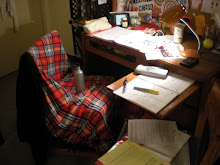Inquiry from my roommates: Don’t reusable metal bottles accumulate huge amounts of bacteria? Do they build up more germs than plastic bottles? Sure we clean our Siggs with soap and water every now and then, but bacteria probably builds up in the lids and mouth pieces.
Good call, homies. Here’s the research.
Metals over Plastics
An Oregon laboratory recently tested used plastic water bottles for bacteria colony counts and discovered “alarming rates” of bacteria, even in the bottles that were recently washed. “A bottle washed the day before the test contained 2,400 colonies. But it was Amy Blue’s bottle that topped the list. While she washed it a few days before the test, the bottle contained 4,100 bacteria colonies.”
According to the Sierra Blogging Post, the best solution would be to cease any use of plastic water bottles.
“Use stainless steel water bottles instead — stainless steel is a healthy alternative to plastic and is naturally bacteria resistant. With all we know about plastic - it leaches chemicals, doesn’t break down, and harbors bacteria - why continue using it?”
(http://blog.sierratradingpost.com/in-outdoors-camping-gear-forest-trails/reused-plastic-water-bottles-loaded-with-bacteria/)
What Producers Say
Sigg has long boasted that its aluminum water bottles have special linings that decrease bacterial build up.
“Due to the finish of the liner, there is much less chance for bacteria build-up with a SIGG as opposed to plastic containers.”
(http://www.shopwiki.com/search/Sigg+8031.90+(803190)+Swiss+Quality+0.6+Liter+Aluminum+Bottle)
Manufacturers of Santa Fe Aluminum Bottles and Epromo Bottles are now also bragging that aluminum and steel products resist bacteria build up. I think it’s a great point for pushing the product. You got me.
(http://www.empirepromos.com/items/SantaFeAluminumBottle19098.php)
Nalgene containers, though finally BPA-free and still competitive with metal containers, do not feature bacteria-resistant linings. Nalgene's supplementary products include treatments to kill bacteria in your bottle and an "anti-microbial Aquaguard" to help prevent growth in your bottle. Plastic surfaces just don't resist bacteria like metal surfaces do.
(http://www.nalgene-outdoor.com/store/detail.aspx?ID=1217)
Why to Care
Some might think that the intake of some bacteria is safe, but more studies are linking stomach ulcers, dysentery, cholera, typhoid, etc. to unsafe drinking water. Keeping water in an environment that hampers bacteria, strains like E. coli will occur more. (http://www.cyber-nook.com/water/tbl_cont.html)
Plus, I sometimes let my friends drink from my bottle, which is an easy transfer of bacteria and viruses. I hear bronchitis is going around.
My answer: You’re exposed to exponentially more bacteria when you reuse plastic bottles, BPA-free or not. Use metal bottles, which have surfaces that accumulate less bacteria and are more easily cleaned with soap and water.
My own unanswered inquiry: What is this secret formula that Sigg uses to make its linings? The company won’t release this information, so I suspect it’s a plastic (it’s elastic and can safely contain acidic drinks). Disclosing the plastic liner material would be a marketing nightmare for Sigg, but it’s a compromise for the suspicions Sigg is causing its customers.
“SIGG has perfected the formula of its proprietary inner liner over decades of scientific research and Swiss engineering. The ingredients (like the formula for Coca-Cola) remain secret and unavailable to 3rd parties so as to ensure SIGG retains its competitive advantage. The key of course is that the SIGG liner is FDA approved and independently tested to be taste and scent inert – and resistant to any leaching (0.0%) so 100% safe.”
(http://www.mysigg.com/index.asp?ID=5&PageAction=Custom#What%20exactly%20is%20the%20SIGG%20liner%20made%20of?)
Subscribe to:
Post Comments (Atom)

lets talk about soft plastic in birth control pill packets. just a thought.
ReplyDeleteHi all of users..
ReplyDeleteCheap disposable plastic plates, plastic tableware, disposable serving dishes, mini dishes, appetizer plates, disposable lunch boxes, bamboo skewers, picks and trays and all catering supplies available.
Our Website.
http://www.Sweetflavorfl.com
Appetizer Plates
ok, it's not about the number of colonies. It's about how many infections people get. Steel and reused plastic (probably even new plastic) have roughly the same amount of bacterium on the openings. but most of that would probably be coming from the mouths of the drinkers where it naturally lives anyway. unless infections are occurring, the presence of bacteria is irrelevant. Toxic chemicals on the other hand...
ReplyDeleteCleaning reusable bottles can definitely be a pain! I recently heard about a new water bottle that uses a replaceable, fully-biodegradable liner (similar concept to a baby bottle) that is supposed to be pretty cool and really easy to keep clean. It is made by FLEXR Sports. If anyone is interested and wants more info, check out their website! www.flexrsports.com
ReplyDelete